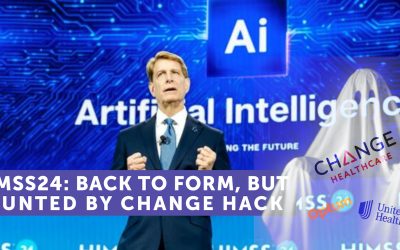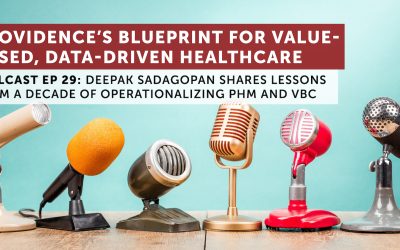Cardiovascular disease is the leading cause of death in America. One out of four adults has two or more chronic diseases. One in three children is overweight or obese. Projections are that by 2050, one third of Americans will have diabetes. These are America’s proverbial ball and chain: lifestyle-driven afflictions that are driving our healthcare spending through the roof, but which can be treated early, mitigated, and in some cases prevented altogether.
Well, what if there was a platform that could help millions to become healthier by encouraging them to take charge of their own health? It could empower people to start living healthier lives through self-driven, day-to-day improvements. Imagine this platform had the following advantages:
- A high profile, endorsed by celebrities and beloved by households
- A captive audience that is eager to engage
- A delivery medium that most of us have in our own homes
- An information-driven approach to get people to change their lifestyles
The Internet has been abuzz about Apple Healthkit, and Samsung SAMI, and Google Fit. But more on those in a minute – I was talking about Doctor Oz.
With a TV audience estimated to be nearly 4 million and growing, and a realm of influence that stretches across the web, print media, and television, The Dr. Oz show has made the eponymous physician into a one-man empire with outsize influence over the hearts and minds of middle America. But not all has been healthy in the land of Oz.
As many in our professional circles cheered and jeered, Senator Claire McCaskill called out Dr. Oz as somewhat of a charlatan in front of the country during a testimony on Capitol Hill a few weeks back. Sen. McCaskill is chairwoman of the Subcommittee on Consumer Protection, Product Safety and Insurance, and has taken offense to Dr. Oz’s repeated soft-selling of “magic” pills for weight loss. Across the Internet, opinions abound about the ethical and professional boundaries Oz has breached by pushing products that, as a trained physician, he must know don’t have any scientifically proven benefits.
To be fair, the show and the content are not otherwise awful.The website is fueled by content from Sharecare, the website/startup run by WebMD founder Jeff Arnold and branded by Oz since 2009. Sharecare is a legitimate health IT play – they even hosted a #bluebutton Twitter chat recently, though like Oz, they can overdo the marketing hype at times. And of course, Mehmet Oz himself is a respected cardiologist with appointments at Columbia University and New York Presbyterian Hospital.
The issue isn’t that Oz is a dud – in fact, it’s that he’s far from it, but he still behaves like one when he’s in front of the cameras, either selling the next miracle cure or getting grilled by a former prosecutor now Congresswoman. As health IT’s own celebrity Doc, Eric Topol puts it in a 2013 New Yorker profile:
“He is keenly intelligent and charismatic. Mehmet was always unique, but now he has morphed into a mega-brand…The problem is that he is eloquent and talented, and some of what he says clearly provides a service we need. But how are consumers to know what is real and what is magic? Because Mehmet offers both as if they were one. It all seems to be in the service of putting on a show. And, when you add it up, that seems like something other than medicine. It’s more like medutainment.”
Some have framed the issue in terms of opportunity cost. With such a valuable platform at his disposal, what might be the public health impact be if Dr. Oz was a stronger advocate for judicious diet, steady exercise, and a more balanced lifestyle rather than miracle pills?
The sad truth is, people probably wouldn’t watch his show. In fact, he probably wouldn’t even have a show in the first place. Oz’s style-over-substance delivery is shaped by his studio audience, not the other way around. He has become so popular because the people watching his show crave shortcuts and quick fixes the same way they crave fast food. To give credit where it’s due, Oz understands the American people better than most of us in healthcare. Now if only he would lead some meaningful patient engagement on our behalf.
As much as we complain about silos in health IT, ignoring what’s going on on daytime TV reinforces our separation from the broader challenges we face in healthcare. We keep ourselves busy dissecting new smartphone platforms like Healthkit and hyping up their allure within our white-collar circles, even as we lose sight of the real competitors. Taco Bell too has been innovating for the masses. Think of five people you know – are they more likely to make sure their labs and meds are up to date for their next doctor’s appointment, or buy a 99-cent Quesarito? Automating data entry on these new platforms might possibly get us past the wall that the PHR industry collided with a few short years ago. But no amount of app automation will let us swipe past our own human nature.
In our innovation-addled culture, it’s understandable when people get excited about unproven promises sold to us by corporate wizards, whether in the form of a “magical” diet pill or a “transformative” ride sharing service or a “revolutionary” smartphone app. Dr. Oz’s recent episode serves as a reminder that in healthcare, there are a different set of standards when it comes to the believing the unproven. As healthcare professionals, we too can be tempted to take a seat in the studio audience and add to the chorus of oohs and aahs about new technology.
Let’s just remember that our industry may be part art and part science, but there’s no magic involved.




Health World . I like this